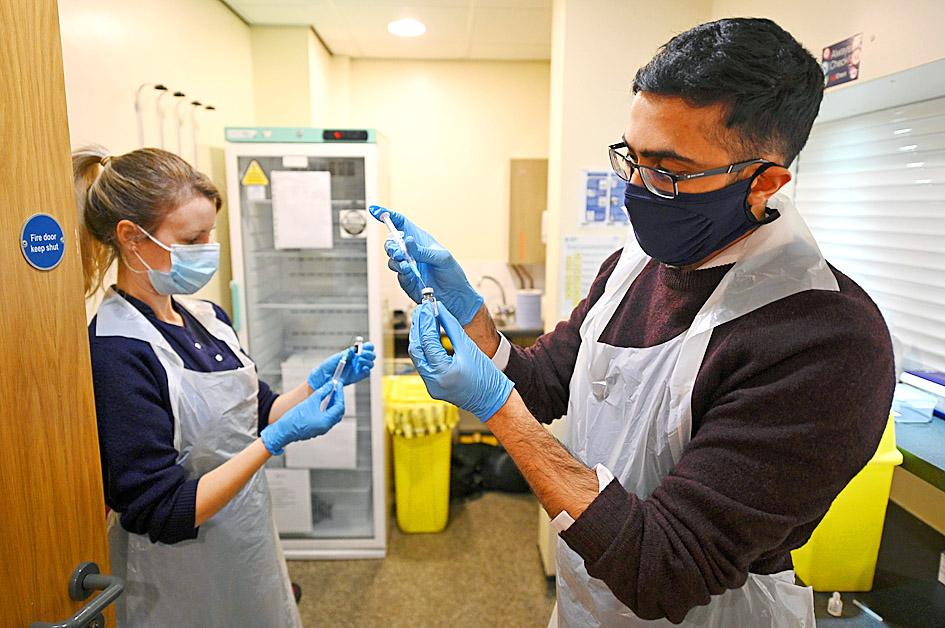The EU on Friday backtracked on a threat to restrict exports of COVID-19 vaccines to Northern Ireland in its growing row with the UK, as the WHO warned against “vaccine nationalism.”
Outbreaks are raging around the globe with COVID-19 deaths nearing 2.2 million, and while wealthy countries fight over limited vaccine supplies, there are fears the less privileged will not get access for a long time.
British-Swedish firm AstraZeneca has said it can only deliver a fraction of its vaccine doses promised to the EU and the UK because of production problems, but both sides are demanding that their pledges are met.

Photo: AFP
The EU threatened to restrict vaccine exports to Northern Ireland by overriding part of the Brexit deal with the UK that allowed the free flow of goods over the Irish border, but backed down after British Prime Minister Boris Johnson voiced “grave concerns.”
The European Commission would “ensure that the Ireland/Northern Ireland Protocol is unaffected,” the EU commissioner said in a statement late on Friday.
That came after the EU released a redacted version of its contract with AstraZeneca, while announcing a mechanism that could allow it to deny the export of vaccines made on European soil.
The AstraZeneca vaccine on Friday became the third to receive EU approval after Pfizer/BioNTech and Moderna, but it came under the shadow of the bitter diplomatic row.
“I expect the company [AstraZeneca] to deliver the 400 million doses as agreed,” European Commission President Ursula von der Leyen wrote on Twitter as she announced the authorization.
The supply issue is a huge blow to Europe’s already stumbling vaccine rollout.
The EU-UK tussle has highlighted the impact of shortages on ambitious mass vaccination programs, even on wealthy nations, and fears are growing that the developed world is hogging doses, leaving poorer nations behind.
WHO Director-General Tedros Adhanom Ghebreyesus on Friday warned against “vaccine nationalism,” saying there was a “real danger that the very tools that could help to end the pandemic — vaccines — may exacerbate” global inequality.
Parts of Africa and Asia have only just started securing and rolling out vaccinations.
The global scramble for shots comes as more troubling data emerged on new variants of the coronavirus, which is known to have infected more than 101 million people worldwide.
Variants first detected in the UK, Brazil and South Africa are believed to be more contagious.
Scientists are concerned that the South African variant might elude some vaccines, a potential stumbling block in the global effort to defeat COVID-19 through mass inoculation.
New data on Thursday and Friday showed that average effectiveness of 89 and 66 percent for shots from Novavax and Johnson & Johnson respectively.
However, while Novavax’s jab was highly effective against the British variant, both were less effective against the South African strain.
Pfizer and Moderna have said their vaccines are effective against the variants.

Kehinde Sanni spends his days smoothing out dents and repainting scratched bumpers in a modest autobody shop in Lagos. He has never left Nigeria, yet he speaks glowingly of Burkina Faso military leader Ibrahim Traore. “Nigeria needs someone like Ibrahim Traore of Burkina Faso. He is doing well for his country,” Sanni said. His admiration is shaped by a steady stream of viral videos, memes and social media posts — many misleading or outright false — portraying Traore as a fearless reformer who defied Western powers and reclaimed his country’s dignity. The Burkinabe strongman swept into power following a coup in September 2022

TRUMP EFFECT: The win capped one of the most dramatic turnarounds in Canadian political history after the Conservatives had led the Liberals by more than 20 points Canadian Prime Minister Mark Carney yesterday pledged to win US President Donald Trump’s trade war after winning Canada’s election and leading his Liberal Party to another term in power. Following a campaign dominated by Trump’s tariffs and annexation threats, Carney promised to chart “a new path forward” in a world “fundamentally changed” by a US that is newly hostile to free trade. “We are over the shock of the American betrayal, but we should never forget the lessons,” said Carney, who led the central banks of Canada and the UK before entering politics earlier this year. “We will win this trade war and

‘FRAGMENTING’: British politics have for a long time been dominated by the Labor Party and the Tories, but polls suggest that Reform now poses a significant challenge Hard-right upstarts Reform UK snatched a parliamentary seat from British Prime Minister Keir Starmer’s Labor Party yesterday in local elections that dealt a blow to the UK’s two establishment parties. Reform, led by anti-immigrant firebrand Nigel Farage, won the by-election in Runcorn and Helsby in northwest England by just six votes, as it picked up gains in other localities, including one mayoralty. The group’s strong showing continues momentum it built up at last year’s general election and appears to confirm a trend that the UK is entering an era of multi-party politics. “For the movement, for the party it’s a very, very big

SUPPORT: The Australian prime minister promised to back Kyiv against Russia’s invasion, saying: ‘That’s my government’s position. It was yesterday. It still is’ Left-leaning Australian Prime Minister Anthony Albanese yesterday basked in his landslide election win, promising a “disciplined, orderly” government to confront cost-of-living pain and tariff turmoil. People clapped as the 62-year-old and his fiancee, Jodie Haydon, who visited his old inner Sydney haunt, Cafe Italia, surrounded by a crowd of jostling photographers and journalists. Albanese’s Labor Party is on course to win at least 83 seats in the 150-member parliament, partial results showed. Opposition leader Peter Dutton’s conservative Liberal-National coalition had just 38 seats, and other parties 12. Another 17 seats were still in doubt. “We will be a disciplined, orderly